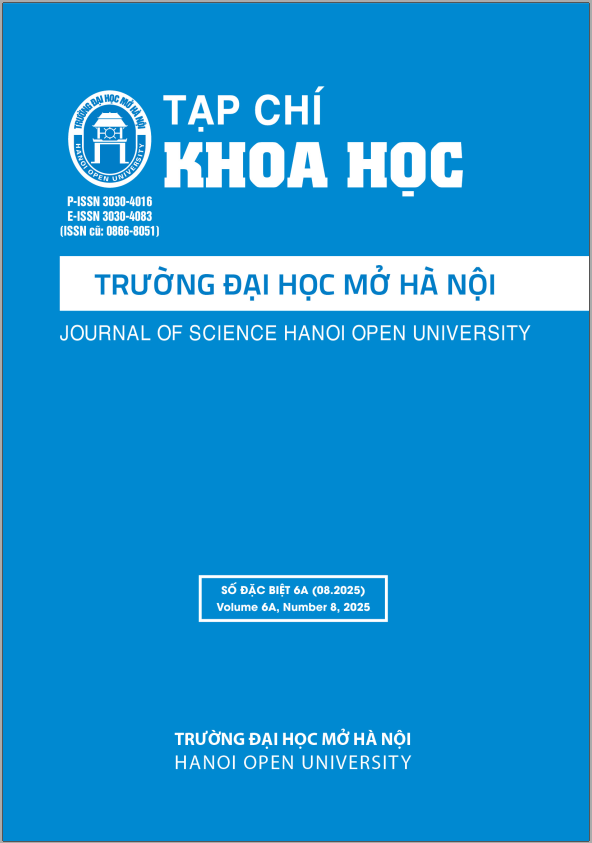TÀI LIỆU THAM KHẢO DO AI HỖ TRỢ: VẤN ĐỀ XÁC THỰC VÀ ĐẢM BẢO LIÊM CHÍNH TRONG NGHIÊN CỨU KHOA HỌC TẠI VIỆT NAM
DOI:
https://doi.org/10.59266/houjs.2025.665Từ khóa:
trí tuệ nhân tạo (AI, chatGPT, liêm chính học thuật, ngụy tạo tài liệu tham khảo, đạo văn, gian lận học thuật, đạo đức AI, thách thức giáo dụcTóm tắt
Sự bùng nổ của trí tuệ nhân tạo (AI) đang tạo nên làn sóng thay đổi sâu rộng trong xã hội loài người. Một số mô hình AI được công bố, đặc biệt là Chat GPT đã có thể tạo ra các văn bản giống con người thực sự và giúp con người viết thư, soạn thảo các bài luận và vô số công việc (Rane et al., n.d.). Chỉ khoảng 2 năm gần đây, ta có thể thấy từ khoá “AI”, “ChatGPT” đã trở thành từ khoá quen thuộc với mọi người Việt Nam. Tuy nhiên, bên cạnh việc ứng dụng các hệ thống mới này là một số thách thức và hạn chế, nhất là với lĩnh vực đạo đức (Kooli, 2023). Một trong những vấn đề đáng lo ngại nhất hiện nay chính là khả năng AI tạo các tài liệu tham khảo hoặc tạo các dữ liệu sai lệch nhưng rất khó bị các công cụ kiểm tra đạo văn truyền thống phát hiện. Bài viết này sẽ nói về hiện tượng sử dụng AI để tạo các tài liệu tham khảo sẽ gây ra những thách thức với việc duy trì liêm chính học thuật và đề xuất các giải pháp để giải quyết vấn đề này. Các giải pháp bao gồm việc xây dựng chính sách rõ ràng với các trường hợp sử dụng trí tuệ nhân tạo, tăng cường đào tạo nhận thức về đạo đức AI, cải thiện các biện pháp đánh giá, công nghệ nhận dạng AI.
Tài liệu tham khảo
[1]. Bhattacharyya, M., Miller, V. M., Bhattacharyya, D., & Miller, L. E. (2023). High Rates of Fabricated and Inaccurate References in ChatGPT- Generated Medical Content. Cureus. https://doi.org/10.7759/cureus.39238
[2]. Chris Stokel-Walker. (2023). ChatGPT listed as author on research papers: many scientists disapprove. Nature Briefing Newsletter. https://doi.org/10.1038/d41586-023-00107-z
[3]. Day, T. (2023). A Preliminary Investigation of Fake Peer-Reviewed Citations and References Generated by ChatGPT. The Professional Geographer, 75(6), 1024-1027. https://doi.org/10.1080/00330124.2023.2190373
[4]. Dempere, J., Modugu, K., Hesham, A., & Ramasamy, L. K. (2023). The impact of ChatGPT on higher education. In Frontiers in Education (Vol. 8). Frontiers Media SA. https:// doi.org/10.3389/feduc.2023.1206936
[5]. Gao, C. A., Howard, F. M., Markov, N.S., Dyer, E. C., Ramesh, S., Luo, Y., & Pearson, A. T. (2023). Comparing scientific abstracts generated by ChatGPT to real abstracts with detectors and blinded human reviewers. Npj Digital Medicine, 6(1). https://doi. org/10.1038/s41746-023-00819-6
[6]. Gopalakrishna, G., ter Riet, G., Vink, G., Stoop, I., Wicherts, J. M., & Bouter, L.M. (2022). Prevalence of questionable research practices, research misconduct and their potential explanatory factors: A survey among academic researchers in The Netherlands. PLOS ONE, 17(2), e0263023. https://doi.org/10.1371/ journal.pone.0263023
[7]. Kabir, S., Udo-Imeh, D. N., Kou, B., & Zhang, T. (2024, May 11).
Is Stack Overflow Obsolete? An Empirical Study of the Characteristics of ChatGPT Answers to Stack Overflow Questions. Conference on Human Factors in Computing Systems - Proceedings. https://doi.org/10.1145/3613904.3642596
[8]. Kooli, C. (2023). Chatbots in Education and Research: A Critical Examination of Ethical Implications and Solutions. Sustainability (Switzerland), 15(7). https://doi.org/10.3390/su15075614
[9]. NAFOSTED. (2022). NAFOSTED-Quy-dinh-ve-liem-chinh-nghien-cuu. https://nafosted.gov.vn/wp-content/ uploads/2022/02/NAFOSTED-Quy- dinh-ve-liem-chinh-nghien-cuu.pdf
[10]. Novy-Marx, R., & Velikov, M. (2025). AI-Powered (Finance) Scholarship *.
[11]. Princeton University. (2025, January 13). Disclosing the Use of AI. Jan 13, 2025 5:41 PM. https:// scholarlyintegrity.princeton.edu/ students/disclosing-generative-ai-use
[12]. Rahman, M. M., & Watanobe, Y. (2023). ChatGPT for Education and Research: Opportunities, Threats, and Strategies. Applied Sciences (Switzerland), 13(9). https://doi.org/10.3390/app13095783
[13]. Rane, N. L., Paramesha, M., & Desai, P. V. (n.d.). Artificial intelligence, ChatGPT, and the new cheating dilemma: Strategies for academic integrity. Artificial Intelligence and Industry in Society 5.0 (Deep Science Publishing, 2024). https://doi. org/10.70593/978-81-981271-1-2_1
[14]. Sanchez-Ramos, L., Lin, L., & Romero, R. (2023). Beware of references when using ChatGPT as a source of information to write scientific articles. American Journal of Obstetrics and Gynecology, 229(3), 356-357. https:// doi.org/https://doi.org/10.1016/j. ajog.2023.04.004
[15]. Spennemann, D., Biles, J., Lachlan Brown, Ireland, M., Laura Longmore, Clare Singh, Wallis, A., & Catherine Ward. (2023). ChatGPT giving advice on how to cheat in university assignments—how workable are its suggestions? https://doi.org/10.21203/ rs.3.rs-3365084/v1
[16]. Springer Nature. (2023). Tools such as ChatGPT threaten transparent science; here are our ground rules for their use. Nature, 613(7945), 612-612. https://doi.org/10.1038/d41586-023-00191-1
[17]. Stokel-Walker, C. (2023). ChatGPT listed as author on research papers: many scientists disapprove. Nature, 613. https://doi.org/10.1038/d41586- 023-00107-z
[18]. Thorp, H. H. (2023). ChatGPT is fun, but not an author. Science, 379(6630), 313-313. https://doi.org/10.1126/ science.adg7879
[19]. Trường ĐH KHXH&NV. (2025, January 15). Quy định về liêm chính học thuật tại Trường ĐH KHXH&NV, ĐHQG-HCM. 15/01/2025.
[20]. Vu, Đ., & Thành Long, N. (2021). Đánh giá liêm chính học thuật của sinh viên qua nhận thức của sinh viên về môi trường học thuật và hành vi không trung thực học thuật. KINH TẾ VÀ QUẢN TRỊ KINH DOANH, 16, 46-63. https://doi.org/10.46223/HCMCOUJS. econ.vi.16.1.1389.2021
[21]. Walters, W. H., & Wilder, E. I. (2023). Fabrication and errors in the bibliographic citations generated by ChatGPT. Scientific Reports, 13(1). https://doi. org/10.1038/s41598-023-41032-5
[22]. York College of Pennsylvani. (2025, June 16). Hallucinations - Artificial Intelligence in Research. Jun 16, 2025 10:58 AM. https://library.ycp.edu/c.php?g=1387233&p=10262462.
